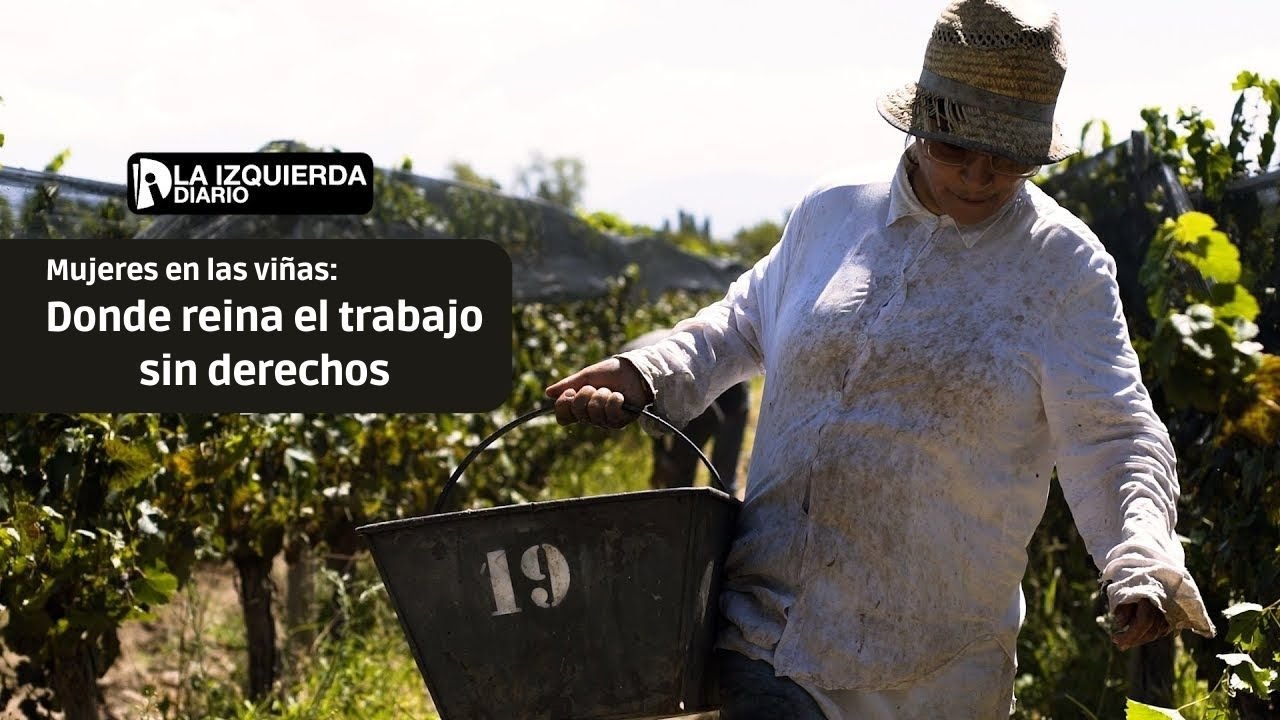
Audiovisual production and realization: Ana Mendez, Flor Sciutti, Kresta Pepe, Lucho Hache, Daniel Barrera and Casandra Martinez
The true queens of the Harvest do not have a party. The party of the rich is not for the workers. The women in the vineyard work on a par with the men, in heavy labor, exposed to the inclement weather and with very low wages. They make the wine that represents Mendoza in the country and the world, but in addition to being temporary, it is a job without rights, without ART coverage, without access to retirement. Even their right to be mothers is violated.
That is the reality that nobody shows. From La Izquierda Diario we want to bring it to light.
The hard-working Mendoza
The reality of the working class is difficult: wages are not enough, prices rise, access to housing is impossible, progress is made on the few labor rights and employers want more.
Informality, above all, is the outstanding characteristic of the reality of the workers. In Mendoza, according to the last census, 42.6% of wage earners have an unregistered job. They are 10 points above the national average.
It is a reality that we share in different sectors. In particular, working women, on whom a wage gap of around 24% is imposed in favor of men. Even a sector does not even receive income, because the owner of the job, the head of the rural family, the beneficiary, is the male of the family.
The women of the vineyards, the wineries, contractors, together with the teachers, nurses, gastronomic and tourism workers, are the most precarious and poor in Mendoza. With salaries very far from the basic basket, “the lowest in the country”, they are the ones that make the province work.
Among them, women workers in viticulture are among the most exploited.
The cradle of wine, the land of Malbec, the land of the sun and good wine, are the slogans that hide the reality of hundreds of thousands of workers who support wine production in conditions of precariousness and poverty.
Still, they come raising their heads. They have made a historic strike in the midst of the pandemic, conquering the highest parity. They organize themselves, they fight the union bureaucracies. There is a long way to go, but above all there is a need to amplify a voice that they intend to make invisible: that of the winery workers.

Double, triple oppression and invisibilization
Ana Maya was one of the protagonists of the 2021 fight, which marked a before and after in the vineyards and wineries. It was she who, at the close of the historic march on April 1, 2021, at km0 stood up and said: “that of the weaker sex is over.” Like her, farm workers, warehouse workers, women from contractor families want to say enough is enough. Her work, which is on a par with men in their conditions and efforts, is greatly invisible. In particular, in the case of contractors, women remain invisible under the definition of “contractor family.”
They work seasonally, unprotected, without ART and without pension contributions, the women on the farms and vineyards do all the tasks (pruning, weeding, weeding, cleaning, watering) and then they have the burden of domestic and care activities, which as all studies show, about 90% falls on women.
The salary is around $80,000, according to the latest joint agreement. It’s not enough. You have to add hours and other jobs. For women who are mothers, the fact that they cannot, as they would like, take care of or share with their sons and daughters is added. For them, in addition, their right to be mothers is violated, “we have to choose between staying with our children hungry or being absent but with a plate of food on the table.”

They are precarious. As Ana says, “there is no farm that hires in cash, like men do.” She is 57 years old and cannot retire, because she does not have her contributions. It is a reality that must be made visible and transformed.
“The Harvest is for tourists, for people who come from abroad”, “but for the workers who are there every day, there is nothing to celebrate”. “None of them know what it is to harvest”, they denounce. The women from the vineyard they work in the furrows, irrigate at any time of the day or carry the 20 kg buckets from a very young age.

In this sense, the “Intercrop Law and against temporary rural work”, presented by Nicolás del Caño, Myriam Bregman, Alejandro Vilca and Romina del Plá, of the FITU in the National Congress is a proposal to alleviate this reality of the workers. rural areas of Jujuy, Tucumán, Salta and Mendoza
Queens, celebrities, businessmen “pose for the photo” with the politicians on duty. The same politicians, from the same parties that govern for the winemakers, guarantee them subsidies, a special dollar, exceptions in the midst of a pandemic, they allow anti-union, arbitrary dismissals and labor fraud of all kinds to pass.

We education workers know very well the living conditions of wine-producing families, their poverty wages in the wineries, family work in rural areas, young people who start school later because they work in the Harvest, of the fear of losing the home of the contractor families, of the hardened hands, of those who do not even reach retirement due to the conditions in which they worked all their lives. That is why we are in solidarity with their claims and accompany them.
But we also identify that the enemies are the same. These are 40 years of governments of the businessmen, the rich, the owners of the land and with the collaboration of the complicit union leaderships. Also from the big media, which reflect the owners of the wine and hide the reality of those who spend their lives between the grooves and the lines.
From the PTS-Left Front we have been contributing everything possible to denounce all this and help to stand up those who make the main industry of our province work. Because we are convinced that, as Ana says, we can change this reality. Our strength can be unstoppable.

Source: www.laizquierdadiario.com

